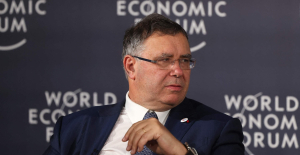It is a declaration in the form of an appeal. To avoid a further slippage in inflation, Christine Lagarde believes that businesses have an important role to play. In an interview given for the first issue of La Tribune Dimanche this Sunday, October 8, the French president of the European Central Bank (ECB) affirms that they “have an interest” in “agreeing to take on their margins – which have not not changed much in 2022 – part of the salary increases which will be negotiated this year and the next.
Otherwise, there is the risk of alienating consumers. “Public opinion will put pressure on it. The public authorities too,” anticipates the former general director of the International Monetary Fund (IMF). In France, this has already started. Just think, for example, of Emmanuel Macron's statements calling on September 24 for “an agreement on the moderation of margins throughout the agri-food sector”. And even, “the drop in demand should (...) lead” companies to take this path, judge in the weekly Christine Lagarde.
This reduction in margins is in any case “the hypothesis integrated into (the) economic forecasts” of the ECB. Because the institution imagines that “companies will behave in the same way as during previous crises, that is to say by reducing their margins a little to integrate part of the salary increases”, explains Christine Lagarde. If this were not the case, inflation could be revised upwards and growth prospects, on the contrary, downwards.
According to the ECB's latest forecasts, inflation in the euro zone should fall to 5.6% this year - after 8.4% in 2022 -, then to 3.2% in 2024 and 2.1% in 2025. “Inflation persists, but it is decreasing. It is even in constant deceleration. This is good news,” said Christine Lagarde in La Tribune Dimanche. As for growth, according to the ECB, it should be 0.7% in 2023 - compared to 3.5% in 2022 -, 1.0% in 2024 and 1.5% in 2025.
Beyond the behavior of companies, the head of the European Central Bank judges that the other uncertainty weighing on the continent's short-term economic outlook is energy prices. “I think we have to get used to the idea that the price of oil will remain high. This should encourage us even more to continue the fight against climate change and to move towards an energy mix less dependent on fossil fuels and external suppliers,” points out the former French Minister of the Economy.

 B:SM will break its investment record this year with 62 million euros
B:SM will break its investment record this year with 62 million euros War in Ukraine: when kyiv attacks Russia with inflatable balloons loaded with explosives
War in Ukraine: when kyiv attacks Russia with inflatable balloons loaded with explosives United States: divided on the question of presidential immunity, the Supreme Court offers respite to Trump
United States: divided on the question of presidential immunity, the Supreme Court offers respite to Trump Maurizio Molinari: “the Scurati affair, a European injury”
Maurizio Molinari: “the Scurati affair, a European injury” Irritable bowel syndrome: the effectiveness of low-carbohydrate diets is confirmed
Irritable bowel syndrome: the effectiveness of low-carbohydrate diets is confirmed Beware of the three main sources of poisoning in children
Beware of the three main sources of poisoning in children First three cases of “native” cholera confirmed in Mayotte
First three cases of “native” cholera confirmed in Mayotte Meningitis: compulsory vaccination for babies will be extended in 2025
Meningitis: compulsory vaccination for babies will be extended in 2025 When traveling abroad, money is a source of stress for seven out of ten French people
When traveling abroad, money is a source of stress for seven out of ten French people Elon Musk arrives in China to negotiate data transfer and deployment of Tesla autopilot
Elon Musk arrives in China to negotiate data transfer and deployment of Tesla autopilot Patrick Pouyanné, CEO of TotalEnergies, is very reserved about the rapid growth of green hydrogen
Patrick Pouyanné, CEO of TotalEnergies, is very reserved about the rapid growth of green hydrogen In the United States, a Boeing 767 loses its emergency slide shortly after takeoff
In the United States, a Boeing 767 loses its emergency slide shortly after takeoff A charred papyrus from Herculaneum reveals its secrets about Plato
A charred papyrus from Herculaneum reveals its secrets about Plato The watch of the richest passenger on the Titanic sold for 1.175 million pounds at auction
The watch of the richest passenger on the Titanic sold for 1.175 million pounds at auction Youn Sun Nah: jazz with nuance and delicacy
Youn Sun Nah: jazz with nuance and delicacy Paris Globe, a new international theater festival
Paris Globe, a new international theater festival Skoda Kodiaq 2024: a 'beast' plug-in hybrid SUV
Skoda Kodiaq 2024: a 'beast' plug-in hybrid SUV Tesla launches a new Model Y with 600 km of autonomy at a "more accessible price"
Tesla launches a new Model Y with 600 km of autonomy at a "more accessible price" The 10 best-selling cars in March 2024 in Spain: sales fall due to Easter
The 10 best-selling cars in March 2024 in Spain: sales fall due to Easter A private jet company buys more than 100 flying cars
A private jet company buys more than 100 flying cars This is how housing prices have changed in Spain in the last decade
This is how housing prices have changed in Spain in the last decade The home mortgage firm drops 10% in January and interest soars to 3.46%
The home mortgage firm drops 10% in January and interest soars to 3.46% The jewel of the Rocío de Nagüeles urbanization: a dream villa in Marbella
The jewel of the Rocío de Nagüeles urbanization: a dream villa in Marbella Rental prices grow by 7.3% in February: where does it go up and where does it go down?
Rental prices grow by 7.3% in February: where does it go up and where does it go down? Even on a mission for NATO, the Charles-de-Gaulle remains under French control, Lecornu responds to Mélenchon
Even on a mission for NATO, the Charles-de-Gaulle remains under French control, Lecornu responds to Mélenchon “Deadly Europe”, “economic decline”, immigration… What to remember from Emmanuel Macron’s speech at the Sorbonne
“Deadly Europe”, “economic decline”, immigration… What to remember from Emmanuel Macron’s speech at the Sorbonne Sale of Biogaran: The Republicans write to Emmanuel Macron
Sale of Biogaran: The Republicans write to Emmanuel Macron Europeans: “All those who claim that we don’t need Europe are liars”, criticizes Bayrou
Europeans: “All those who claim that we don’t need Europe are liars”, criticizes Bayrou These French cities that will boycott the World Cup in Qatar
These French cities that will boycott the World Cup in Qatar MLS: new double for Messi who offers victory to Miami
MLS: new double for Messi who offers victory to Miami PSG-Le Havre: Ramos on his way, Kolo Muani at the bottom of the hole… Favorites and scratches
PSG-Le Havre: Ramos on his way, Kolo Muani at the bottom of the hole… Favorites and scratches Football: Vasco da Gama separates from its Argentinian coach Ramon Diaz
Football: Vasco da Gama separates from its Argentinian coach Ramon Diaz F1: for the French, Ayrton Senna is the 2nd best driver in history ahead of Prost
F1: for the French, Ayrton Senna is the 2nd best driver in history ahead of Prost

















